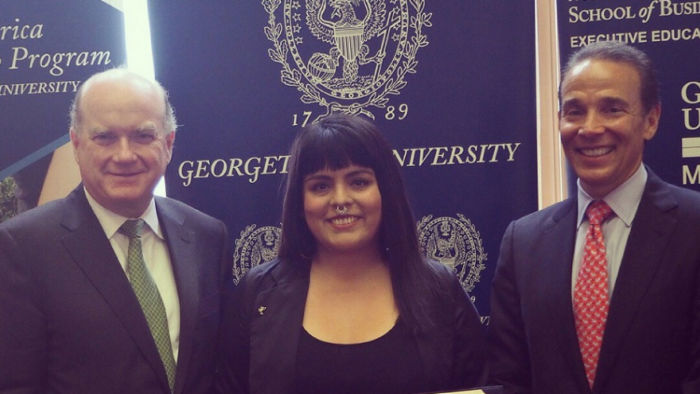
Lucía Chuquillanqui is a force of nature. Spend just two hours with her and it’s easy to see how she has already led such an extraordinary life at just 26 years-old. But despite what some may perceive as a fairy tale, from her days at Fe y Alegría No. 32 in San Juan de Lurigancho, Peru to her most recent accomplishments at Georgetown University in Washington, D.C., Lucía is clear on the role hard work and education have played in her life. “Inclusive and quality education has given me opportunities that I didn’t even know I had”, she says.
***
In many ways San Juan de Lurigancho is just like any other barrio on the outskirts of Lima, Peru. Children walk down a dirt road on a hill to get to school. Neighbors survive intermittent days without electricity or water. But for Lucía Chuquillanqui, this is home.
Her memories are similar to the many who grow up in marginalized and vulnerable communities across Latin America. However, in spite of these challenges, Lucía’s memories are full of admiration for the working people of her community and of gratitude for the work of Fe y Alegría. “Maybe it sounds very romantic and super cliché but remembering my childhood, walking on a dirt road towards the hill where Fe y Alegría No. 32 is, I would never have imagined that all of this was possible for me.”

Lucía’s first encounter with Fe y Alegría, when she was just starting third grade, was a bit of a shock. “There were students who were very concerned about their grades and others who were concerned about sports or workshops, and I had never felt that before. It was a difficult change at the beginning because I was outside my comfort zone and I had to try harder to be able to continue being a good student”, explains Lucía.
But it was her father, who had also studied at a Fe y Alegría school in the area –Fe y Alegría No. 5–who insisted that she and her brother study at Fe y Alegría No. 32 in San Juan de Lurigancho. “He was convinced that it was the best option my brother and I could have in our neighborhood, which is a complex neighborhood, full of violence, with many, many economic gaps but at the same time, a neighborhood full of people eager to be better”, she states.
After overcoming her initial shock at the differences between her old school and this new school, where the infrastructure, the dedication of the faculty, and the capacity and competition between the students, surprised her, she started to feel at home and began a lifetime relationship that continues to this day.
Fe y Alegría No. 32 not only prepared her academically during elementary and high school, but it also opened the doors to the possibility of attending college through a scholarship program at the Jesuit-run Antonio Ruiz de Montoya University. “The Ruiz de Montoya University offered eight scholarships for more than 60 schools in the country and I got the last scholarship. I was going to study Political Sciences”, comments proudly Lucía. “Two people from Fe y Alegría 32 got in, which was a good sign that my school was doing things well”.
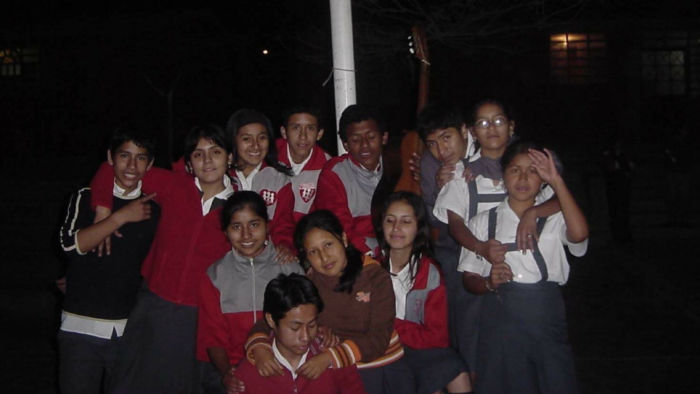
Her time at Ruiz de Montoya was different from her time at Fe y Alegría, but it was also a time when Fe y Alegría was always present. “When we started college, it was very clear that those of us who grouped together were those who knew the slum – from different areas but in the end all slums are the same– and all the students of the different Fe y Alegría schools hung around like a herd”, affirms Lucía. “At the beginning there was a complex process of adapting to this new reality and new people because one day we were in San Juan de Lurigancho and the next day we were in Pueblo Libre (a middle-class neighborhood), and the change was quite drastic but also interesting and the university established ways for us to adapt”.
Lucía felt the presence of Fe y Alegría in her life much more when the network of Jesuit universities established an agreement in which scholarship students in any Jesuit university could choose to do a semester abroad in another Jesuit university, anywhere in the world at no cost, except maintenance expenses. “I had a full scholarship and, together with another friend of Fe y Alegría No. 37, Jennifer Ponce, I asked the Ruiz de Montoya to do a semester at the Ibero-American University of Mexico and we were the first students to do the exchange”, she explains. Despite being accepted for the student exchange program, Lucía and Jennifer encountered some issues. First, the fear and prejudice of two women traveling and living alone in another country and, second, how to pay for their living expenses during their stay in Mexico. Fe y Alegría was the answer to both problems. “Jennifer and I decided to look for Fe y Alegría and we did it in the most spontaneous way possible; we told Father Jesús Herrera about it and he gave us the option of being our guarantor and supporting us in obtaining the student visa. And not only that, he also put us in touch with a friend of his to host us [during our time there] and with a family to cover our food for six months. So, we went from having nothing, not even the plane ticket, to having all of this. And I think that marked part of our identity as citizens and how Fe y Alegría is part of us.”
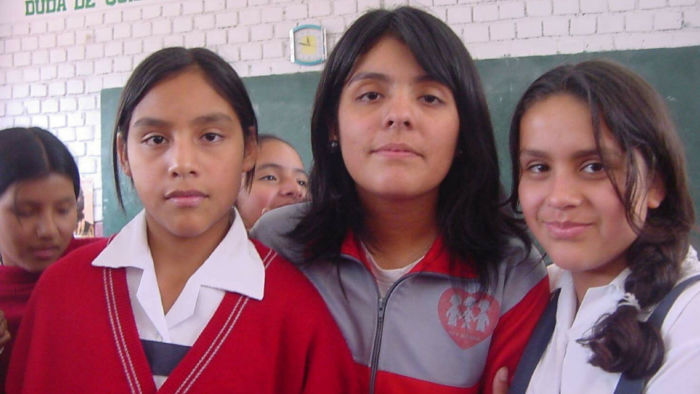
***
Encouraged by her father regarding the importance of learning English for her academic and professional life, Lucía applied for a scholarship to study the language. “I studied for three years, from 14 to 16 years old, every morning from 7:00 am to 8:30am and I think that was key for my job search.”
Her first job was as an intern at her university’s library to meet the required hours for her graduation. She also worked as an assistant in the Ministry of Education, and later in the Municipality of Lima in the Urban Planning Institute. Due to her interest in media, she was also employed in a magazine called “Etiqueta Negra” and from there she went on to work in the World Wildlife Fund, where she continues to work today. “It’s one of the best jobs I’ve had because it’s an international organization that values diversity within its team, not only by including women in their projects but also people with different perspectives and this has been super interesting”, adds Lucía. “I believe that none of this would have been possible had I not had the education I had in Fe y Alegría, in university, my training in English as well as my constant search to learn more.”
And it was precisely this desire to continue learning that brought Lucía to the United States, through the Professional Fellows Program of the Bureau of Educational and Cultural Affairs of the United States Department of State where she focused on environmental issues. After her time in the program and encouraged by the U.S. government, Lucía applied for the Opportunity Funds Program of EducationUSA, which is a program that seeks to give financial assistance to professionals who, despite having the knowledge, do not have the necessary financial resources to apply for postgraduate courses in American Universities. “The Opportunity Funds Program appeared as a solution and as an opportunity, as there is a large economic gap because the cost of preparing for these exams [TOEFL, GRE] is high, taking the exams is expensive, and applying to universities even more so and this is why it is necessary to try to stabilize the balance and expand the options for people who come from realities like mine. In every application I send to universities I start by saying that I come from a barrio called San Juan de Lurigancho and I speak about Fe y Alegría’s educational model. I do not use it as a marketing hook, but to contextualize them about the importance of having quality education and that the biggest gap I have is the lack of economic resources”, comments Lucía.
Without knowing what the results of all her applications to the Master programs in the US would be, and in her search for opportunities to continue expanding her experience and knowledge, Lucía began to devise a Plan B. The solution came through the Global Competitiveness Leadership program at Georgetown University (GCL), in which 34 young leaders from 19 Latin America countries spend 10 weeks developing and presenting projects that benefit their country of origin and that must be implemented upon completion of the program. The program is valued at $25,000 USD, which is covered by a donor, but applicants must also demonstrate access to at least $2,000 USD to cover their costs during their stay in the country. Lucía would raise the $2,000 USD through a crowdfunding campaign, but the cost of the program would be covered by a donor. “In the interview with the donor, one of the topics [we talked about] was Fe y Alegría. Sometimes I assume that everyone knows what Fe y Alegría is and know about their educational model but sometimes it turns out that they do not and everyone should know it! I think that interested him. He did know about Fe y Alegría and had been involved with the organization before and also knew about my university; so then I felt it was simpler to explain him who I am and where I come from, what my identity is and how my perspective is important for this type of projects.” However, after this interview Lucía still didn’t know if she was going to get a spot in the program and the scholarship. She had to go through another interview round, this time with Georgetown… “And they told me I had got in!”

The project that Lucía Chuquillanqui presented in Georgetown is Malquerida. When asked about Malquerida, Lucía’s face lights up.
After discovering that the mass media and the stories that are told are, largely, managed by men, Lucía along with three friends, founded Malquerida. Malquerida is a digital platform in Spanish, created, produced and graphed entirely by and for women, which seeks to empower and encourage women to write more about important issues and create the best pieces of journalism from the voice of women. “What we do is connect women who want to write and develop their stories with our editors and give them a platform to publish them.”
By creating Malquerida, Chuquillanqui and the rest of the team, was looking not only to give a voice to women with a desire to tell stories but also to create quality texts and new editorial references. And, although they did not expect it, they also started to win prizes. “Our first prize came with a story called ‘Cama adentro’ (Live in), about the situation of [live in] domestic workers in Peru. It was awarded to us by the Fundación de Nuevo Periodismo Iberoamericano (Foundation of New Ibero-American Journalism) for journalism about inequality,” explains Lucía. “This recognition was accompanied by a cash prize to develop an investigation into the situation of forced relations during the government of Alberto Fujimori and that was our first break that made us believe that we are actually doing something good.”
Lucía and her partners continue to work to grow the platform and have a greater impact, in which more women can tell their stories, because for Chuquillanqui “in the current historical context, the perspective and experience of being a woman are very different from those of a man and we need to tell more stories from our voice. It doesn’t matter who that voice belongs to, as long as it is from our voice as women, because we believe that any topic is an issue that involves us; at the end of the day we are half of the world population.”
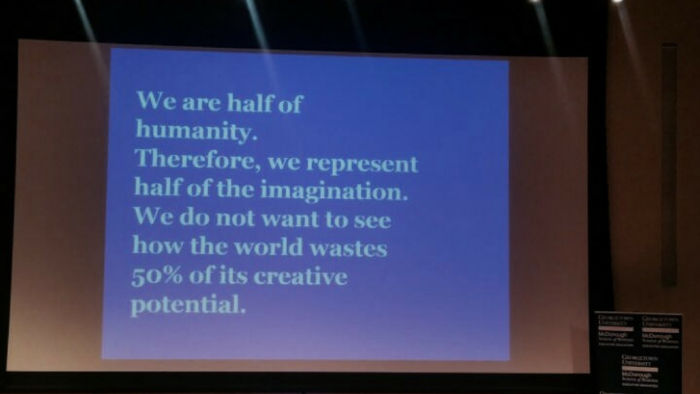
However, the ultimate goal of Malquerida is to cease to exist. “We will continue to write stories from women’s voices at least until the gender gap in the area closes and we are no longer needed.”
But Malquerida was not the only thing Lucía preached about during her time in Georgetown. “I left with the satisfaction that everyone already knows what Fe y Alegría is. Of the 33 leaders, I think what they would say about me is that: I am a feminist, I live in San Juan de Lurigancho and I am from Fe y Alegría. As many of my colleagues are interested in educational issues, I spoke to them about Fe y Alegría and their educational model and told them that to have a real impact it is necessary to start from the primary education of children in slums. Education is a right and is the most important right that we should demand from governments and public and private institutions.”
“We have to continue working for educational models like Fe y Alegría. We must be very proud to talk about Fe y Alegría. I encourage more men and women from Fe y Alegría to tell their stories. In a world where we are trying to close the gaps, educational models such as Fe y Alegría have to be known. We are Fe y Alegría”, says Lucía.
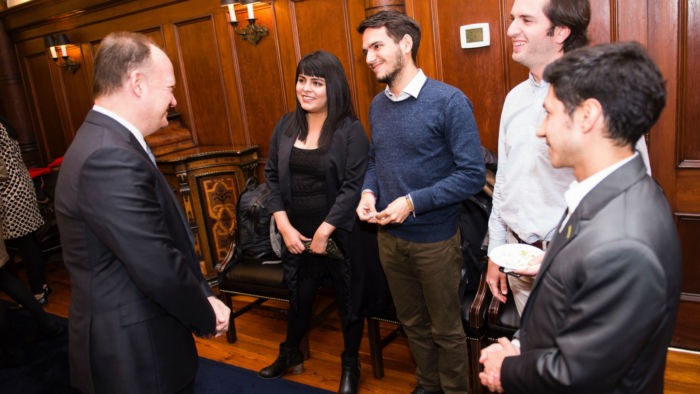
***
Telling her story about what she has accomplished may seem easy, but Lucía’s path has not been an easy one. In addition to the economic barriers and the fact of fighting a constant internal struggle to not limit herself, Chuquillanqui has had to learn to deal with competitiveness and rejection. “During all these years I have applied to a lot of programs, looking for traineeships, looking for more experience abroad, to also grow my resume and to have better job opportunities; because, at the end of the day, for those of us who come from marginalized neighborhoods closing the gap means being able to make more money to help our families. I have applied to many [traineeships] and have been rejected from many. But rejections do not make me as sad anymore, because just as I have been rejected, I have also been accepted into several programs. And it has been a great learning experience for me. We should not panic about the ‘noes’, I have received many ‘noes ’in my life but I have also received some very important ‘yeses’ that have changed my life and have helped me to be where I am.”
She thanks Fe y Alegría and the Jesuits for her education, her identity and the sense of belonging she has with San Juan de Lurigancho, since they taught her that “The slum does not limit you, you can be whatever you want.” Nonetheless, Lucía points out the importance of hard work. “It is not a case that you can be whatever you want and it will fall from the sky; you have to work hard for your dreams with the tools that education and, in my case, Fe y Alegría gives you. I have many friends from Fe y Alegría who have stayed in their neighborhood and are now successful entrepreneurs, have invested their money in textile goods, have opened their own businesses, they have bought their fleets of cars and motorcycles for taxis, and have a sense of belonging to the community. Because not all dreams are the same, but I do think the people of Fe y Alegría come back and defend the school and its educational model for the opportunities it has given them and their future generations.”
Yet just as it is important to work hard to achieve your dreams, Lucía emphasizes that opportunities must also be created and encourages everyone to demand the right to education for all. “We have to be clear that we do have something in our favor and it is that no one has lived our circumstances, and sometimes living our day to day reality is much more difficult or complicated than studying for an exam. Where we are from can be our biggest advantage and we must know how to capitalize on that fact with a lot of effort and training,” affirms Lucía. “I particularly encourage women to pursue their education and dreams, because if it is true that there is an educational gap to close, there is an even bigger gender gap, and therefore my message is more directed towards women that education and opportunities are also for us, and it will cost us more, but it can have very interesting results. We have the right to education.”
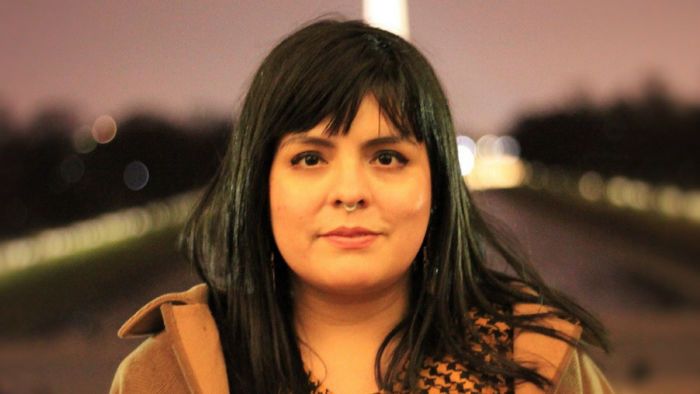
Although Lucía continues to look for opportunities to study in the U.S., she only pictures herself working in her home country of Peru. “I want to revolutionize the public policies of Peru by including women from the beginning of the conception of a project without forcing anything. We have to rethink our public policies, because we have created everything from a male perspective.”
***
Update: After having applied to six Masters programs in the US, Lucía has been accepted in four. In September 2018, she will start her Master in International Relations at the Syracuse University.
